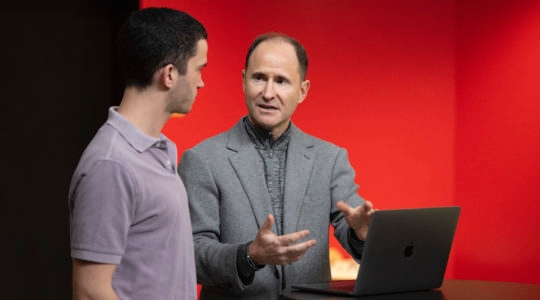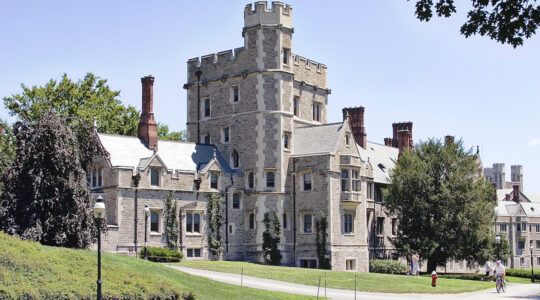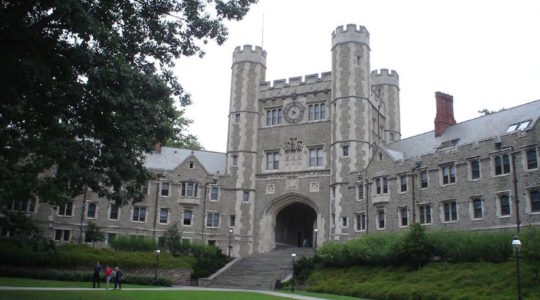NEW YORK (JTA) – After months of deliberation, the Jewish Theological Seminary has decided to accept qualified gay and lesbian students to its rabbinical and cantorial schools.The move was enabled by a December decision by the Conservative movement’s legal authorities to reverse the movement’s traditional ban on gay clergy.Arnold Eisen, the seminary’s chancellor-elect, announced the decision March 26 in an e-mail to the JTS community.The change comes after months of consultation, including the commissioning of a movement-wide survey that found support for the move among a majority of Conservative rabbis, cantors, lay leaders and seminarians.Also Monday, the seminary announced it would extend the application deadline from Dec. 31 until June 30 to accommodate new applicants as a result of the policy change. The change in admissions standards follows a similar one enacted by the movement’s West Coast seminary, the Ziegler School of Rabbinic Studies at the University of Judaism in Los Angeles, which recently admitted two openly gay students for the fall term.Monday’s decision follows a long and often divisive debate over Conservative Judaism’s attitude toward homosexuality.That discussion culminated with the decision by the Committee on Jewish Law and Standards to overturn centuries of legal precedent by allowing for the ordination of gay rabbis and for movement rabbis to officiate at same-sex commitment ceremonies.In keeping with the movement’s commitment to halachic pluralism, the committee also endorsed two contrary opinions, or teshuvot, upholding the traditional position. Two additional opinions, both of which would have removed all restrictions on homosexual activity, were not adopted. Still, four committee members resigned to protest the permissive ruling.Though Eisen’s leadership on this issue won broad praise for its transparency and inclusiveness, the challenges ahead may be formidable. In addition to pacifying elements in the movement that oppose the change, the Conservative leadership also faces resistance from those uncomfortable with an understanding of pluralism that tolerates the exclusion of gays and lesbians.Rabbi Ayelet Cohen, a JTS graduate and associate rabbi at Congregation Beth Simchat Torah, a synagogue for gays and lesbians in New York City, took issue with the paeans to pluralism issuing from the seminary Monday.Cohen said welcoming people of all sexual orientations should be “a value and not an option.””I think that we’re dealing with a very long tradition of Jewish text and scholarship, and in the scope of Jewish history the movement toward equality and celebrating Jews of all sexual orientations and gender identities is fairly new,” she said. “There’s a lot we need to do to start teaching that as a value, just as there’s a lot the Conservative movement needs to do to teach egalitarianism as a value.”Among the movement’s international affiliates, some of which had warned that they might split from the movement in the wake of the December decision, the announcement was greeted with dismay.Rabbi Wayne Allen, president of the Ontario division of the Rabbinical Assembly, the movement’s rabbinic association, told JTA that some Canadian synagogues already were contemplating their long-term association with their American counterparts, and Monday’s move only affirms the wide gulf between them.”I do not think this decision is going to have a great impact on whether synagogues are going to be more inclined to progress with these decisions or less inclined,” Allen said. “What is going on now is a process that is larger than any one issue.”In Israel, the board of the Schechter Rabbinical School has placed authority for the issue in the hands of the school’s dean, Rabbi Einat Ramon, an acknowledged opponent of gay ordination. Ramon is said to be working on a position paper on the issue that will be released shortly.According to the movement-wide survey, released in January, Israeli rabbis were divided evenly on the question of gay ordination. Canadian rabbis overwhelmingly opposed the change, 82 percent to 18 percent.Sensitive to the ramifications of the decision, Eisen on Monday also announced a series of steps to contain the fallout, including a dialogue within the movement regarding the principles of Conservative Judaism and intensified contact with its international arms.”I think we need to take steps to affirm again that more unites us than divides us,” Eisen said. “That disagreement, if it exists, is accepted in a spirit of halachic pluralism and mutual respect.”The debate over homosexuality for years has been a lightning-rod issue in the Conservative movement, with both sides warning of the dire consequences if the other position were accepted.Opponents warned that a permissive ruling would undermine the movement’s claim to be halachic, or committed to Jewish law, and would render it indistinguishable from Reform Judaism.Proponents of change argued that a failure to liberalize would further weaken the movement – once American Judaism’s largest, but now second to Reform – and drive would-be rabbis to other streams.”People are thrilled,” said Elizabeth Richman, a rabbinical student and co-chair of KeshetJTS, a student group advocating for the equality of gays and lesbians. “We really believe that this decision is going to strengthen and grow the Conservative movement.”
JTA has documented Jewish history in real-time for over a century. Keep our journalism strong by joining us in supporting independent, award-winning reporting.





